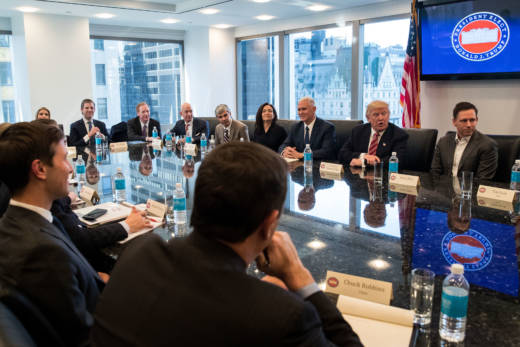Elizabeth's company makes software for industries ranging from retail to banking. As a diversity and inclusion specialist, she pushes to make sure product focus groups are diverse.
“Even that gets an eye roll,” she said. “Just asking for an audience that is representative of the population as opposed to who we can get now, who are the easiest people to access.”
Tech companies have acknowledged the need to diversify their workforce, but despite these high-profile commitments, the road has been slow going. Diversity numbers at many tech companies have barely budged. And people of color say while the industry talks a lot about diversity, in general it’s not a top priority and initiatives to bring about change are met with resistance.
Elizabeth says one important ally has been President Obama. For one thing, she says, Obama was beloved by many in Silicon Valley and so had influence. Another reason?
“These companies do government work, and so to be on the good side of the administration there was pressure to really commit to diversity and inclusion,” Elizabeth said.
Obama urged tech executives to be more inclusive of women and people of color. And in response, the CEOs of Airbnb, Lyft and Intel, among others, initiated an “Inclusion Pledge.”
To date, some 80 companies have pledged to publish annual reports on the makeup of their workforce and to put in place policies and resources to train, recruit and retain more women, blacks and Latinos.
Elizabeth said the pledge created a tiny bit of leverage.
“Signing a pledge isn’t the thing that makes companies change,” she said. “But for the people doing diversity and inclusion work, you can say, 'Hey, this is what you stated to do and your actions better line up.' ”
If Obama played good cop by cajoling and flattering tech leaders to change, the Department of Labor has been bad cop.
Erin Connell practices employment law at Orrick in San Francisco and represents companies that do business with the federal government.
“There definitely has been a focus on the technology sector within the Department of Labor,” Connell said.
She says federal compliance officers have taken a tougher, more adversarial tone with tech companies. And for the first time in recent memory, the Department of Labor sued three Silicon Valley companies -- Palantir, Google and Oracle -- for alleged violations of equal employment opportunity laws.
The companies deny wrongdoing.
Connell speculates that the lawsuits are the Obama administration's last-ditch effort to try to shore up its legacy.
“With the inauguration right around the corner, I think they’re running out of runway,” Connell said.
She believes the lawsuits will continue under a Trump administration but said “hypothetically, at any time the Department of Labor could choose to no longer pursue these lawsuits.”
Advocates believe that’s exactly what will happen under a Trump administration and fear they’ll lose another pressure point.
But Ellen Pao, the chief diversity and inclusion officer at Kapor Capital, is more optimistic. Pao emerged as a vocal advocate for diversity after losing a high-profile gender discrimination lawsuit against the venture capital firm Kleiner Perkins Caufield & Byers in 2015.
Pao says that in reaction to the election, she’s seen some tech leaders, especially at up-and-coming companies, become even more committed to diversity.
“I’m excited because I think these startups are going to be the next wave of successful startups,” Pao said.
As a co-founder of Project Include, Pao works with CEOs of early-stage startups to try to build a culture of diversity from the start.
“You know in tech there is still very much a herd mentality,” Pao said.
When these new companies become successful with a diverse and inclusive workforce, she said, Trump or no Trump, it will be that success that paves the way for real change in Silicon Valley.
This story is part of our ongoing series on Techquity: Diversity, Inclusion and Equity in Silicon Valley.
